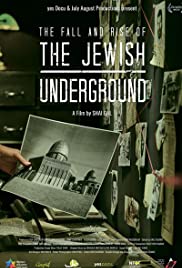
THE JEWISH UNDERGROUND
Israel, 2017, 91 minutes, Colour.
Directed by Shai Gal.
This is a very interesting documentary. It is directed towards an Israeli audience but is certainly arresting for those outside Israel. It is a glimpse at ultra-orthodox Jews, their righteous religious beliefs, their being prepared to act fanatically in terms of violence against opposition.
The film is designed as something of a detective story, the filmmakers taking the audience back into the past, identifying characters, showing them in past footage as well as contemporary interviews.
The film is framed with the possibility of a live sacrifice at the Temple site in Jerusalem.
The reality of the Jewish Underground is highlighted by contemporary interviews with two of the major participants in a plan to blow up the Dome of the Rock and re-establish the third Temple. Their beliefs were based on the Bible, God’s Word, the predominance of Jewish law over secular law. They employed a man to build bombs, stole weapons from the police, produced a cache of guns and explosives, hidden on the Golan Heights. Their first action was assassination attempts on several of the measures of Palestinian cities, then an attack on a school in Hebron, the placing of explosives on a number of buses which would wreak devastation in peak hour, finally a plan for the Dome of the Rock.
The film also has interviews with two officials from Shin Bet (who also appeared in the informative and provocative documentary about Shin Bet, The Gateway). The officials explain how difficult the case was, to identify members of the Underground, getting clues, following hunches, making connections, using lie detectors, using bluff. There were eventually able to prevent the explosion on the Temple site.
The film focuses also on the arrests, committal to trial, the hearings, interviews with the judge who later had important roles in Israeli justice, the prison sentences, the continued lenience and pardons, as well as much popular support.
The interviews with the older men involved in the Underground are striking because of their continued beliefs, underlying fanaticism, their access to the Knesset, to politicians willing to appear with them, including Benjamin Netanyahu, rallies for their beliefs even in the Knesset.
An important look back into Israel’s history but an important look at religious and political influences in the present.
1. The impact of the film as a documentary, as history, as a documentary for Israel in 2017?
2. The intentions of the filmmaker, to explore the past, to expose the right-wing fanaticism leading to violence? The relevance for the contemporary audience and the members of the Underground influencing Israeli society, parliamentarians and advisers?
3. The structure of the film – the equivalent of a detective story, tracing the development, finding the clues, following the leads?
4. The Jerusalem setting, the range of scenery, the roads and the views, the feel for the city? The footage from the past? The musical score?
5. The issue of the temple, the Dome of the Rock, the mosques? The Western Wall?
6. The range of talking heads, the plotters, the old men reminiscing, their vigour, rigorous holding to views? The role of the carpenter, his memories about the bombs? Seeing them in the footage? The reality of them talking to camera after the 30 or more years? Their stating the validity of their views after the decades? The basic idea, to destroy the Dome of the Rock, for it to collapse, to rebuild the temple? To oust the Muslims? The planning, the bombs, the construction of the bombs, the role of the carpenter, the cache of ammunition in the Golan Heights?
7. The story of the attacks, the assassination attempts on the mayors? The Underground seeing them as criminals? The attack on the school in Hebron? The plans to put the bombs on the buses so that they would go off peak times?
8. The attitudes, deaths, few regrets, a cause, God’s command, the basis in scripture, the righteous stances, Jewish law and not secular law?
9. The picture of the Shin Bet, the two gatekeepers, their role, the range of personnel for the investigations, the secular perspective, their role in the past and explanations, being interviewed in the present? The difficulties in finding the members of the Underground, the clues, hunches, names, connections, the lie detector, the bluffs? The investigating stating that at the plot succeeded, there was a danger of war in the Middle East, even nuclear war?
10. The visualising of the board, the various names, photos, inscriptions?
11. The Dome of the Rock, the plan for the bombing, the leads, the cars following the Underground, their being apprehended?
12. The case, the accused, going to trial, the judge? Her role in the past? The subsequent responsibilities for Israeli courts? Her being interviewed in the present, her perspective?
13. Public support for the Underground, people cheering them, offering them food, opinions, the media?
14. The trial, the hearings, the sentences, their being changed, more lenient stances, pardons, the men getting out of jail, continuing their work?
15. The Knesset, their presence, their views, the Shin Bet against them? Coming to position of prominence, the meetings with politicians, ministers, with Benjamin Netanyahu, at rallies, even in the Knesset building, the role as advisers? The picture of the enthusiastic young Orthodox and their cause?
16. The framing of the film with a literal sacrifice – symbol of the cause?
17. The impact for Israeli audiences? And beyond?